过去时态句型转换
各种时态的句型转换
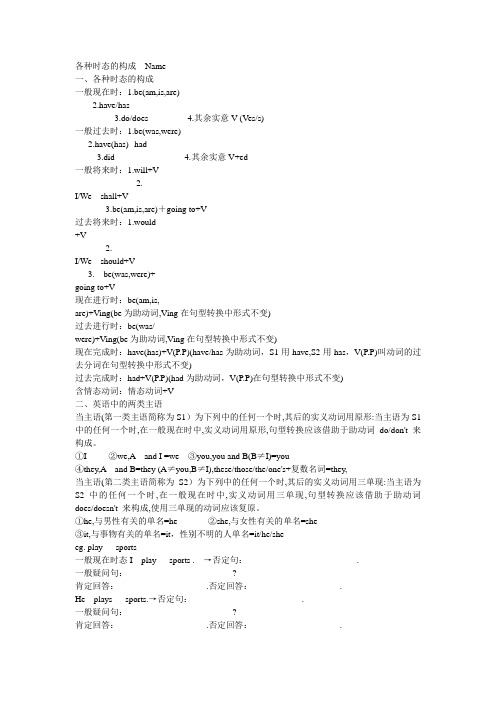
各种时态的构成Name_________一、各种时态的构成一般现在时:1.be(am,is,are)2.have/has3.do/does4.其余实意V (Ves/s)一般过去时:1.be(was,were)2.have(has)--had3.did4.其余实意V+ed一般将来时:1.will+V2.I/We shall+V3.be(am,is,are)+going to+V过去将来时:1.would+V2.I/We should+V3. be(was,were)+going to+V现在进行时:be(am,is,are)+Ving(be为助动词,Ving在句型转换中形式不变)过去进行时:be(was/were)+Ving(be为助动词,Ving在句型转换中形式不变)现在完成时:have(has)+V(P.P)(have/has为助动词,S1用have,S2用has,V(P.P)叫动词的过去分词在句型转换中形式不变)过去完成时:had+V(P.P)(had为助动词,V(P.P)在句型转换中形式不变)含情态动词:情态动词+V二、英语中的两类主语当主语(第一类主语简称为S1)为下列中的任何一个时,其后的实义动词用原形:当主语为S1中的任何一个时,在一般现在时中,实义动词用原形,句型转换应该借助于助动词do/don't 来构成。
①I ②we,A and I =we ③you,you and B(B≠I)=you④they,A and B=they (A≠you,B≠I),these/those/the/one's+复数名词=they,当主语(第二类主语简称为S2)为下列中的任何一个时,其后的实义动词用三单现:当主语为S2中的任何一个时,在一般现在时中,实义动词用三单现,句型转换应该借助于助动词does/doesn't 来构成,使用三单现的动词应该复原。
①he,与男性有关的单名=he ②she,与女性有关的单名=she③it,与事物有关的单名=it,性别不明的人单名=it/he/sheeg. play sports一般现在时态I play sports . →否定句:_________________________.一般疑问句:________________________?肯定回答:____________________.否定回答:____________________.He plays sports.→否定句:_________________________.一般疑问句:________________________?肯定回答:____________________.否定回答:____________________.一般过去时态I played sports . →否定句:_________________________.一般疑问句:________________________?肯定回答:____________________.否定回答:____________________.He played sports.→否定句:_________________________.一般疑问句:________________________?肯定回答:____________________.否定回答:____________________.一般将来时态I will/shall play sports. →否定句:_________________________.一般疑问句:________________________?肯定回答:____________________.否定回答:____________________.I am going to play sports.→否定句:_________________________.一般疑问句:________________________?肯定回答:____________________.否定回答:____________________.He will play sports. →否定句:_________________________.一般疑问句:________________________?肯定回答:____________________.否定回答:____________________.He is going to play sports.→否定句:_________________________.一般疑问句:________________________?肯定回答:____________________.否定回答:____________________.过去将来时态I would/should play sports. I was going to play sports.He would play sports. He was going to play sports. 现在进行时态I am playing sports . →否定句:_________________________.一般疑问句:________________________?肯定回答:____________________.否定回答:____________________.He is playing sports.→否定句:_________________________.一般疑问句:________________________?肯定回答:____________________.否定回答:____________________.过去进行时态I was playing sports.→否定句:_________________________.一般疑问句:________________________?肯定回答:____________________.否定回答:____________________.He was playing sports.→否定句:_________________________.一般疑问句:________________________?肯定回答:____________________.否定回答:____________________.现在完成时态I have played sports. →否定句:_________________________. 一般疑问句:________________________?肯定回答:____________________.否定回答:____________________.He has played sports.→否定句:_________________________.一般疑问句:________________________?肯定回答:____________________.否定回答:____________________.过去完成时态I had played sports. →否定句:_________________________. 一般疑问句:________________________?肯定回答:____________________.否定回答:____________________.He had played sports.→否定句:_________________________.一般疑问句:________________________?肯定回答:____________________.否定回答:____________________.三、用下列动词词组造句1.play computer games →plays→playing→played→played一般现在时态I____________________________ He______________________一般过去时态I____________________________ He______________________一般将来时态I____________________________ /I____________________________ He______________________/He______________________过去将来时态I____________________________ He______________________现在进行时态I____________________________ He______________________过去进行时态I____________________________ He______________________现在完成时态I____________________________ He______________________过去完成时态I____________________________ He______________________2listen to music →listens→listening→listened→listened一般现在时态I____________________________ He______________________一般过去时态I____________________________ He______________________一般将来时态I____________________________ /I____________________________ He______________________/He______________________过去将来时态I____________________________ He______________________现在进行时态I____________________________ He______________________过去进行时态I____________________________ He______________________现在完成时态I____________________________ He______________________过去完成时态I____________________________ He______________________3.do housework →does→doing→did→done一般现在时态I____________________________ He______________________一般过去时态I____________________________ He______________________一般将来时态I____________________________ /I____________________________ He______________________/He______________________过去将来时态I____________________________ He______________________现在进行时态I____________________________ He______________________过去进行时态I____________________________ He______________________现在完成时态I____________________________ He______________________过去完成时态I____________________________ He______________________4.sing →sings→singing→sang→sung一般现在时态I____________________________ He______________________一般过去时态I____________________________ He______________________一般将来时态I____________________________ /I____________________________ He______________________/He______________________过去将来时态I____________________________ He______________________现在进行时态I____________________________ He______________________过去进行时态I____________________________ He______________________现在完成时态I____________________________ He______________________过去完成时态I____________________________ He______________________5.swim→swims→swimming→swam→swum一般现在时态I____________________________ He______________________一般过去时态I____________________________ He______________________一般将来时态I____________________________ /I____________________________ He______________________/He______________________过去将来时态I____________________________ He______________________现在进行时态I____________________________ He______________________过去进行时态I____________________________ He______________________现在完成时态I____________________________ He______________________过去完成时态I____________________________ He______________________6.draw →draws→drawing→drew→drawn一般现在时态I____________________________ He______________________一般过去时态I____________________________ He______________________一般将来时态I____________________________ /I____________________________ He______________________/He______________________过去将来时态I____________________________ He______________________现在进行时态I____________________________ He______________________过去进行时态I____________________________ He______________________现在完成时态I____________________________ He______________________过去完成时态I____________________________ He______________________7.dance →dances→dancing→danced→danced一般现在时态I____________________________ He______________________一般过去时态I____________________________ He______________________一般将来时态I____________________________ /I____________________________ He______________________/He______________________过去将来时态I____________________________ He______________________现在进行时态I____________________________ He______________________过去进行时态I____________________________ He______________________现在完成时态I____________________________ He______________________过去完成时态I____________________________ He______________________8.run→runs→running→ran→run一般现在时态I____________________________ He______________________一般过去时态I____________________________ He______________________一般将来时态I____________________________ /I____________________________ He______________________/He______________________过去将来时态I____________________________ He______________________现在进行时态I____________________________ He______________________过去进行时态I____________________________ He______________________现在完成时态I____________________________ He______________________过去完成时态I____________________________ He______________________。
一般过去时的几种句型

一般过去时的几种句型The final revision was on November 23, 2020人称代词用来代替表示人或事物的名词,以便不再重复使用名词。
1)人称代词的主格在句子中作主语用法举例:1.My name is Millie. I live in Beijing. ( I代自己, Millie )2. Sandy, do you know where Mr Wu is ( you代Sandy )3. Simon loves football. He is a member of the football team.4. Millie loves Eddie. She looks after him every day. (she 代 Millie)5. This book is very interesting. It is about cartoons. (it 代this book)6. I am Daniel and this is Amy. We are in Class 1, Grade7. (we 代替 Amy and I)2)人称代词的宾格在句子中作宾语(放在动词后面或者介词后面)me the answer, please.(动词后面)’s go.(=let us go) (动词后面)3. Look at him. He is funny! (介词后面)物主代词的定义:物主代词实际上是人称代词的所有格形式。
物主代词可以分为形容词性和名词性两种。
形容词性物主代词一定要后接名词(如:This is my book. 这是我的书。
),名词性物主代词可以独立使用,无需后接名词(如:This book is mine. 这本书是我的。
)。
3) 形容词性物主代词一般位于名词前,用作定语,限定该名词的意义This is my book.4) 名词性物主代词的句法功能a. 作主语,例如:May I use your pen Mine is broken.(mine=my pen)我可以用一用你的钢笔吗我的坏了。
一般过去时态句型转换方法归纳
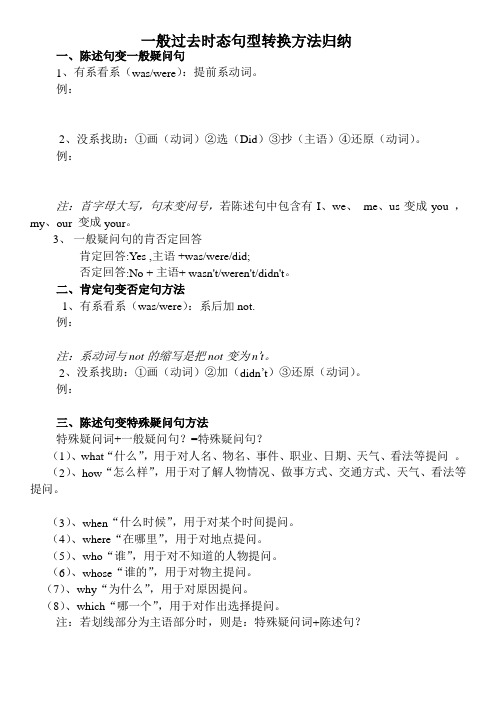
一般过去时态句型转换方法归纳
一、陈述句变一般疑问句
1、有系看系(was/were):提前系动词。
例:
2、没系找助:①画(动词)②选(Did)③抄(主语)④还原(动词)。
例:
注:首字母大写,句末变问号,若陈述句中包含有I、we、me、us变成you ,my、our 变成your。
3、一般疑问句的肯否定回答
肯定回答:Yes ,主语 +was/were/did;
否定回答:No + 主语+ wasn't/weren't/didn't。
二、肯定句变否定句方法
1、有系看系(was/were):系后加not.
例:
注:系动词与not的缩写是把not变为n’t。
2、没系找助:①画(动词)②加(didn’t)③还原(动词)。
例:
三、陈述句变特殊疑问句方法
特殊疑问词+一般疑问句?=特殊疑问句?
(1)、what“什么”,用于对人名、物名、事件、职业、日期、天气、看法等提问。
(2)、how“怎么样”,用于对了解人物情况、做事方式、交通方式、天气、看法等提问。
(3)、when“什么时候”,用于对某个时间提问。
(4)、where“在哪里”,用于对地点提问。
(5)、who“谁”,用于对不知道的人物提问。
(6)、whose“谁的”,用于对物主提问。
(7)、why“为什么”,用于对原因提问。
(8)、which“哪一个”,用于对作出选择提问。
注:若划线部分为主语部分时,则是:特殊疑问词+陈述句?。
(完整版)一般过去时句型转换
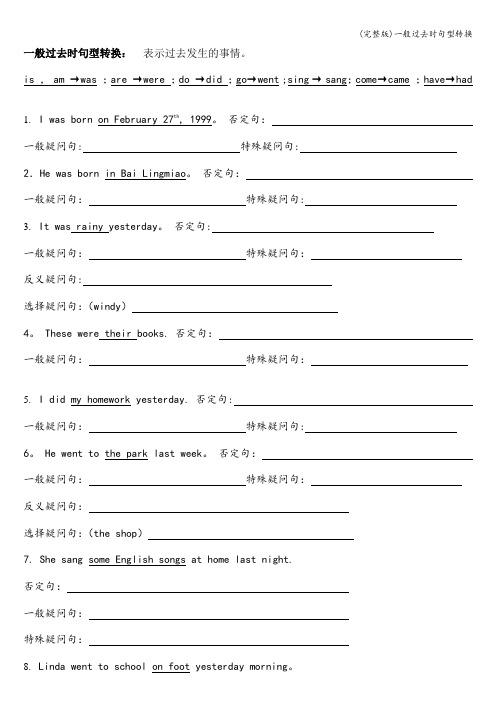
一般过去时句型转换:表示过去发生的事情。
is , am →was ;are →were ;do →did ;go→went ;sing → sang;come→came;have→had1.I was born on February 27th, 1999。
否定句:一般疑问句: 特殊疑问句:2.He was born in Bai Lingmiao。
否定句:一般疑问句:特殊疑问句:3.It was rainy yesterday。
否定句:一般疑问句:特殊疑问句:反义疑问句:选择疑问句:(windy)4。
These were their books. 否定句:一般疑问句:特殊疑问句:5.I did my homework yesterday. 否定句: 一般疑问句:特殊疑问句:6。
He went to the park last week。
否定句:一般疑问句:特殊疑问句:反义疑问句:选择疑问句:(the shop)7. She sang some English songs at home last night.否定句:一般疑问句:特殊疑问句:8.Linda went to school on foot yesterday morning。
否定句:一般疑问句:特殊疑问句:反义疑问句:选择疑问句:(by bike)9.They lived in a big house 10 years ago. 否定句: 一般疑问句:特殊疑问句:10.The twins liked swimming last year. 否定句: 一般疑问句:特殊疑问句:反义疑问句:选择疑问句:(running)11.There used to be lots of flowers in the garden years ago.否定句:一般疑问句:特殊疑问句:。
一般过去时态的用法和答题技巧

一般过去时一般过去时:表示过去某一时间发生的动作或者存在的状态。
一般过去时的动词使用动词过去式。
动词原形变动词过去式的变化规则:1)一般直接在动词后面加上ed. 例如:work(工作)---worked; play(玩)---played;look(看)---looked; wait(等待)----waited;2)以e结尾的动词,加d. 例如:dance---danced(跳舞); like---liked(喜欢)Move---moved(移动); close---closed(关闭)3)以辅音字母+y结尾的动词,将y变成ied.例如:study---studied(学习); carry---carried(扛)4)以重读闭音节结尾且词尾只有一个辅音字母的动词,双写这个辅音字母再加ed. 例如:stop---stopped(停止); plan----planned(计划);5)不规则:(小学期间参考六年级下册课本第69页内容,只能全部死记下来)例如:go---went(去);come---came(来);have---had(有);do---did(做)下面我们来看几个例句:例如:1) Smiths一家上周去北京了。
The Smiths went to Beijing last week.2) 去年我住在上海。
I lived in Shanghai last year.3)那个老人三年前在学校里教数学。
That old man taught maths at school three years ago.4)我上周六去看了一场篮球赛。
I watched a basketball match last Saturday.练习题:一、写出下列动词的过去式:make--- watch--- read--- fly--- talk--- fix--- study--- do--- have--- play--- eat---- drink--- work--- snow--- walk--- talk--- dance--- like---- carry--- draw--- wash--- know--- run--- come--- ride--- sit--- shop--- cut--- get--- go--- write--- swim--- put----二、请翻译下列句子:1)你上周末做了什么?我周六的时候打扫我的房间。
初中四种时态的构成,定义,用法和句型转换
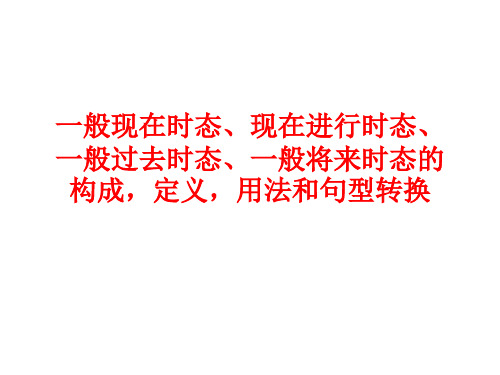
tomorrow?
• 9. What
you
(do)
every morning?
• 10. English?
you
(read)
Yes, I am.
• 11.
your brother
(buy)
you anything special? No,he didn’t.
• 12. My parents
(not
guitar at all, he
(like) playing chess.
• 5.
your father
interesting books.
(have) some
• 6. Look! What
you
(do) ?
• 7. What
you
(do) last
night?
• 8. What
you
(do)
• 1.One of my friends school on foot every day.
(go ) to
• 2.There bottle.
( be ) some water in the
• 3.
Tom
(visit) our school next
week?
• 4My father
(not like) playing the
• 3.
?
My
pen pal comes from He Nan.
• 4.
.
You’re welcome.
• 5. ---
Hello!
?
--- Hi! This is Bill
• 6. ---
?
--- He’s my father.
一般过去时
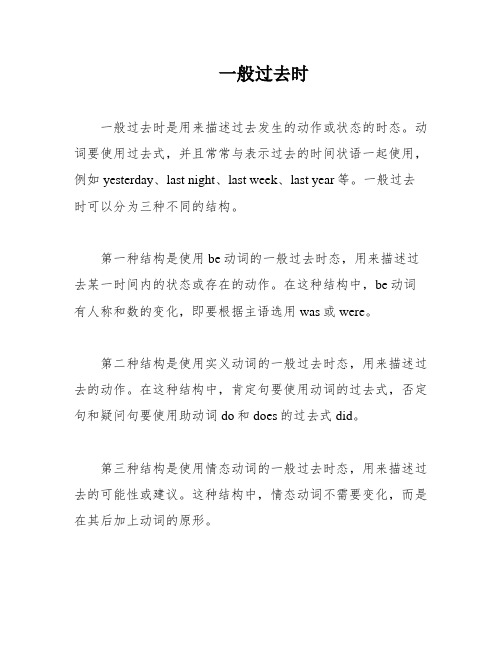
一般过去时一般过去时是用来描述过去发生的动作或状态的时态。
动词要使用过去式,并且常常与表示过去的时间状语一起使用,例如yesterday、last night、last week、last year等。
一般过去时可以分为三种不同的结构。
第一种结构是使用be动词的一般过去时态,用来描述过去某一时间内的状态或存在的动作。
在这种结构中,be动词有人称和数的变化,即要根据主语选用was或were。
第二种结构是使用实义动词的一般过去时态,用来描述过去的动作。
在这种结构中,肯定句要使用动词的过去式,否定句和疑问句要使用助动词do和does的过去式did。
第三种结构是使用情态动词的一般过去时态,用来描述过去的可能性或建议。
这种结构中,情态动词不需要变化,而是在其后加上动词的原形。
需要注意的是,在构成一般过去时的助动词did和didn't后面要跟动词的原形,而且do和does的过去时均为did。
因此,在使用一般过去时时,需要注意动词的形式和助动词的使用。
例如,原句“XXX.”可以改写为“XXX.”,否定句为“I didn’t do XXX.”,一般疑问句为“Did you do your homework yesterday?”,回答可以是“Yes。
I did.”或“No。
I didn’t.”。
1.情态动词的过去式为can→could。
may→might。
must→had to。
will→would。
should→should have。
2.特殊疑问句的构成形式有三种:a。
特殊疑问词+be过去式+主语+其他?b。
特殊疑问词+情态助动词过去式+主语+动词原形+其他?c。
特殊疑问词+do/does过去式+主语+动词原形+其他?例如:What was your former name?(你以前叫什么名字?)Why was he late for school last Monday?(上星期一他为什么迟到?)What could she do twenty years ago?(20年前她能做什么?)3.一般过去时的判断标志词包括:yesterday,the day before yesterday,last + 时间,this morning + 时间 + ago,just now,a moment ago,in + 过去的时间。
语法练习题时态转换

语法练习题时态转换一、现在时转过去时1. He opens the door. (door - close)- He closes the door.2. They eat breakfast. (eat - have)- They had breakfast.3. I go to school. (go - went)- I went to school.4. She speaks French. (speak - spoke)- She spoke French.5. We see a movie. (see - saw)- We saw a movie.二、过去时转现在时1. He closed the door. (door - open)- He opens the door.2. They had breakfast. (have - eat)- They eat breakfast.3. I went to school. (go - go)- I go to school.4. She spoke French. (speak - speak)- She speaks French.5. We saw a movie. (see - see)- We see a movie.三、现在进行时转过去进行时1. The children are playing in the park. (play - play)- The children were playing in the park.2. She is studying in the library. (study - study)- She was studying in the library.3. We are watching a movie at home. (watch - watch) - We were watching a movie at home.4. They are cooking dinner in the kitchen. (cook - cook) - They were cooking dinner in the kitchen.5. He is playing the guitar in his room. (play - play)- He was playing the guitar in his room.四、过去进行时转现在进行时1. The children were playing in the park. (play - play) - The children are playing in the park.2. She was studying in the library. (study - study)- She is studying in the library.3. We were watching a movie at home. (watch - watch)- We are watching a movie at home.4. They were cooking dinner in the kitchen. (cook - cook)- They are cooking dinner in the kitchen.5. He was playing the guitar in his room. (play - play)- He is playing the guitar in his room.五、将来时转过去时1. I will meet her tomorrow. (meet - met)- I met her.2. They will visit their grandparents next month. (visit - visited) - They visited their grandparents.3. She will finish the project next week. (finish - finished)- She finished the project.4. We will travel to Europe next year. (travel - traveled)- We traveled to Europe.5. He will buy a new car next week. (buy - bought)- He bought a new car.六、过去完成时转现在完成时1. I had finished my homework. (finish - finish) - I have finished my homework.2. They had gone to the beach. (go - go)- They have gone to the beach.3. She had read the book. (read - read)- She has read the book.4. We had eaten lunch. (eat - eat)- We have eaten lunch.5. He had written a letter. (write - write)- He has written a letter.七、现在完成时转过去完成时1. I have finished my homework. (finish - finish) - I had finished my homework.2. They have gone to the beach. (go - go)- They had gone to the beach.3. She has read the book. (read - read)- She had read the book.4. We have eaten lunch. (eat - eat)- We had eaten lunch.5. He has written a letter. (write - write)- He had written a letter.总结:语法练习题中的时态转换对于英语学习者来说是非常重要的。
- 1、下载文档前请自行甄别文档内容的完整性,平台不提供额外的编辑、内容补充、找答案等附加服务。
- 2、"仅部分预览"的文档,不可在线预览部分如存在完整性等问题,可反馈申请退款(可完整预览的文档不适用该条件!)。
- 3、如文档侵犯您的权益,请联系客服反馈,我们会尽快为您处理(人工客服工作时间:9:00-18:30)。
I.句型转换1. The children had a good time in the park.否定句:______________________________________一般疑问句:________________________________________ 对划线部分提问:__________________________________2. There were about nine hundred people at the concert.(音乐会) 否定句:__________________________________________一般疑问句:________________________________________ 对划线部分提问:____________________________________3. There was only one problem.否定句:__________________________________________一般疑问句:________________________________________ 肯定/否定回答:____________________________________4. Ann did her homeworkyesterday evening.否定句:__________________________________________一般疑问句:________________________________________ 对划线部分提问:____________________________________对划线部分提问:____________________________________5. Last week I read an English book.否定句:_________________________________________一般疑问句:________________________________________ 肯定/否定回答:____________________________________对划线部分提问:____________________________________对划线部分提问:____________________________________6. My brother was in the park just now.否定句:__________________________________________一般疑问句:________________________________________ 肯定/否定回答:____________________________________对划线部分提问:____________________________________对划线部分提问:____________________________________ 7. She had some bread for lunch today.否定句:__________________________________________一般疑问句:________________________________________肯定/否定回答:____________________________________对划线部分提问:____________________________________8. They read English last night.否定句:__________________________________________一般疑问句:________________________________________肯定/否定回答:____________________________________对划线部分提问:____________________________________II. 用所给词的适当形式填空。
1. Tom and Mary ___________ (come) to China last month.2. Mike _________________(not go) to bed until 12 o’clock last night.So he ______ (get ) up late.3. Mary __________ (read) English yesterday morning.4. There _________ (be) no one here a moment ago.5. I ___________ (call) Mike this morning.6. I listened but ___________ (hear) nothing.7. Tom ___________ (begin) to learn Chinese last year.8. Last week we _________ (pick) many apples on the farm.9. My mother ________________ (not do) housework yesterday.10. She watches TV every evening. But she __________ (not watch) TV last night. 11.________ your father ________ ( go ) to work every day last year?12.--What time _______ you _______ (get) to Beijing yesterday?--We __________ (get) to Beijing at 9:00 in the evening.13. What __________ (make) him cry (哭) just now?14. Last year the teacher _________ (tell) us that the earth moves around the sun.15. There ____________ a telephone call for you just now. (be)16. There __________ not enough people to pick apples that day. ( be)17. There _____________( be not) any hospitals in my hometown (家乡) in 1940.18. There ____________ enough milk at home last week, wasn’t there?19. Eli ____________ to Japan last week.( move)20. –When _______ you _________ (come) to china?--Last year.21. Did she ________ (have) supper at home?22. Jack ____________ (not clean) the room just now.23. _________ (be) it cold in your city yesterday?24. How many people ________ (be) there in your class last term?25. It ________ (be) hot yesterday and most children _______ (be) outside.26. There ________ (be) a football match on TV yesterday evening, but I_________ (have) no time to watch it.27. What ________ Tom ________ (do) on Saturday evening?He ________(watch) TV and__________(read) an interesting book.28. They all _________(go) to the mountains yesterday morning.29. She _________(not visit) her aunt last weekend. She ________ (stay) at home and _________(do) some cleaning.30. When ________ you _________(write) this song?I __________(write) it last year.There be结构练习题1.桌子上有一本书和两支钢笔。
There ______ a book and ______ ______ on the desk.2.在吉姆的书包里有一些书。
______ ______ ______ ______ in Jim’s bag.3.书包里有一些地图吗?______ ______ ______ ______ in the bag?4.我们学校有许多学生。
There ______ many ______ in our school.5.树上没有鸟。
There ______ ______ birds in the tree.6.在老师的办公室中有一张桌子。
There ______ ______ ______ in the teachers’ office.7.在桌子上有些书。
There are ______ ______ on the desk.8.在你的课桌上有一块橡皮和两把尺子。
There ______ ______ ______ and ______ on your desk.9.在铅笔盒有几支铅笔和一支钢笔。
______ ______ ______ ______ and a pen in the pencil-box. 10.我们的教室里没有一台电脑。
______ ______ ______ ______ in our classroom.do- watch- go- learn- type-teach- visit- speak-have- work-write- can- play- come- drop-find- spend- see- begin- win-stay- keep- feed- sweep- wash- clean- is/am- don't- are- wait-surprise- get- count- read- sit-can't- talk- think- call- fly-want- help- finish- study- walk-stand- love- arrive- take- climb-give- phone- plant- become- run-meet- ask- make-crawl- lie-eat- sleep- fall- start- listen- graduate- cook- buy- rain- swim- say- happen- miss- send- dance- hurry- wake- jump- put- shout-。
